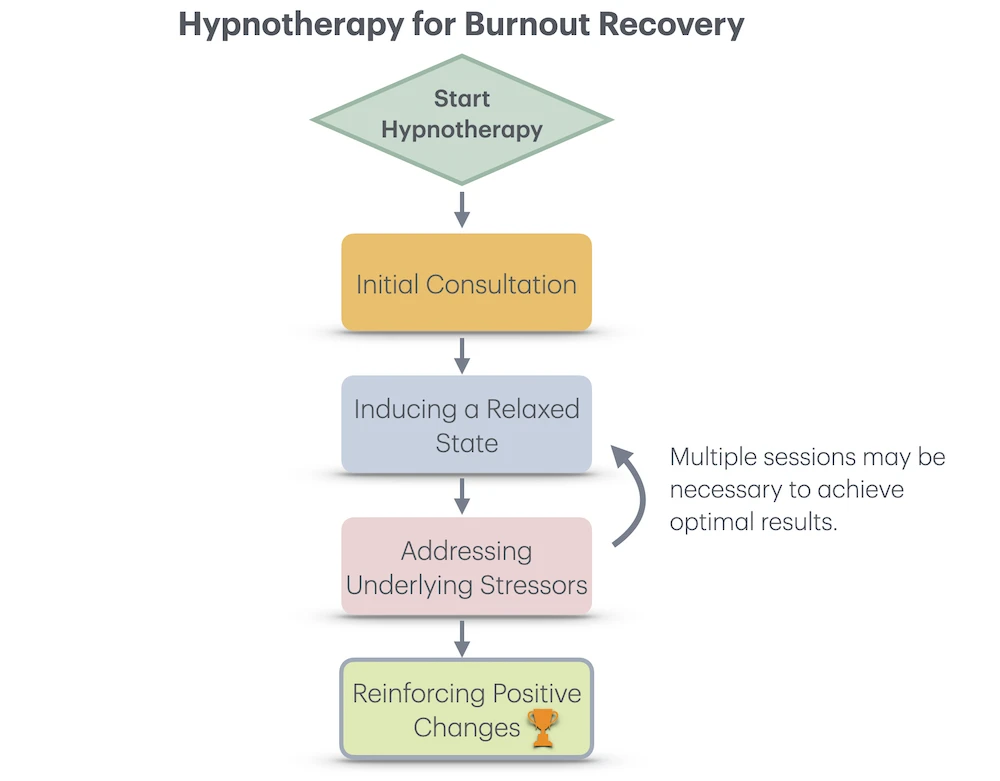You’re Not Alone
If you’re reading this while signing off work due to stress, first know that you’re taking an important step in protecting your health. According to Champion Health United Kingdom, 79% of working professionals report that work-related stress impacts their mental and physical health.

Big names such as Justin Bieber, Lady Gaga, and Britney Spears took long mental health breaks before returning to the industry. In this case, you’re also not alone, and it is fine to take time to recover, which is both brave and necessary
Key Takeaways
- Taking time off for mental health is a brave and necessary step.
- Why stress leave is a legitimate option for mental health recovery.
- How does hypnotherapy address underlying stressors and help reduce stress?
- How to set clear boundaries and expectations to prevent future burnout.
Understanding Work-Related Stress (Burnout)
Dr. Christina Maslach, a leading researcher in occupational burnout, explains, “Burnout is not a problem of individuals but of the social environment in which they work. Workplace stress is a situation, not a weakness.”
Common signs that led you here might include:
- Persistent exhaustion
- Sleep is never enough, or insomnia
- Low concentration
- Feeling isolated or trapped
- Procrastination
- Physical symptoms like headaches or body pain
- Feeling overwhelmed by tasks you once managed easily
- Changes in sleep patterns or appetite
- Increased irritability or emotional reactions
If you have experienced any of these symptoms, you might consider signing off work. The line between stress, burnout, and mental illness can often blur together. Just as you wouldn’t ignore a physical injury, each of these signs is equally important to look for support, attention, and care. If you know you are dealing with slight changes which are leading to stress, it’s a sign of strength and self-awareness. Now you are strong enough to recognise your problem. Let’s try to solve this by first signing off work.
How to Get Signed off Work for Stress
What is Stress Leave?
Stress leave is a legitimate form of leave when work-related stress impacts your mental well-being.
Paid Leave Options
- Full-time employees are typically entitled to 10 paid sick days annually.
- Part-time employees need to receive pro-rata sick leave benefits.
Paid Sick Leave
Available to permanent employees, which covers mental health conditions, requires proper documentation. Plus, it has the same benefits as physical illness leave.
Unpaid Leave Options
Available when paid leave is exhausted. It may be necessary for extended recovery, but it is important to consider financial planning. It could be eligible for disability benefits
Review your employment contract, discuss options with HR confidentially, and get proper medical documentation. Since you know how to get signed off work, now it’s your duty to understand the recovery process.
Follow along with me in this blog to know more about how you can recover effectively after signing off work.
Complete Step-by-Step Guide to Your Recovery Journey
According to HBR, a stress management program defines Recovery as a paradox.
Think of your mind and body like a rechargeable battery. When you are under pressure at work, struggling to focus on an empty stomach, that’s exactly when your body needs to be recharged, but in the end, it becomes a paradox.
Here’s what typically happens:
- You’re overwhelmed at work → You skip breaks to catch up
- Skipping breaks → Less energy → Grabbing quick, unhealthy meals
- Poor nutrition → Even less energy → Skip exercise
- No exercise → Poor sleep → Wake up exhausted
- Start the next day depleted → Cycle continues → BURNOUT!!!
Just as you wouldn’t expect your phone to run without charging, you can’t sustain performance without proper rest and recovery.
In this step by step recovery guide on how you can get signed off work with stress and anxiety.
Let’s look into it.
1- Rest First After Signing off Work
Rest helps our minds and bodies relax in the wake of stress. Stress causes muscle tension, which in turn causes headaches, stomach pain, back pain, and more all symptoms of burnout.
Your primary focus should be rest and disconnection from work. Dr. Bessel van der Kolk, trauma expert and author of “The Body Keeps the Score,” states “The critical issue is allowing yourself to know what you know. That takes an enormous amount of courage.“
Resist the urge to fix all your problems and stay calm.
So, what action steps you can take to recover while resting:
Inform key people about your absence
Keep it simple: “I’m taking medical leave and will be unreachable”
Set up an out-of-office message and turn off all work notifications.
Create a healing environment
Take the first few days to transition from the fast-paced work environment to a more relaxed state. Designate a peaceful space in your home. Remove all work-related items from view (laptop, sticky notes, charts, documents) and stock up on healthy foods and water.
Engage yourself in a hobby
Ask yourself what excites you? If you find anything that you find peace in any physical activity, engage yourself in it. For some people, it is cooking, gardening, walking, making Lego castles, etc.
2- Build your Recovery To Do List
Dr. Daniel Siegel, clinical professor of psychiatry, says, “The key is neural integration – engaging both your body and mind in the healing process.”
Start by maintaining a daily structure from morning, afternoon and evening. Do some gentle movement (walking, stretching), mindfulness practice, creative activities and end your day with relaxation routines while listening to calming music.
But wait, is it that simple? Will your stress anxiety go with only rest? You are not on home arrest or something, right? Let’s see what we can do about it.
Why Rest Alone Isn’t Enough for Recovery
Being signed off work with stress is an important first step, but rest alone often isn’t enough. While taking time off and resting provides temporary relief, long-term recovery requires finding the root causes of stress. This is where hypnotherapy can become your support in the recovery process, helping individuals retrain their minds and manage stress effectively.
3- Getting the Right Help in Stress
Getting the right support at the time of recovery can help you reduce stress and regain yourself faster than ever. Research shows that professional support significantly improves recovery outcomes. A study involving over 100 patients with stress-related conditions found that 75% reported improvement in their symptoms after 12 weeks of self-hypnosis practice.
So you might wonder, what is hypnotherapy?
Hypnotherapy is a relaxation method that helps calm your mind and reduce work stress. During the hypnosis session, the therapist guides you into a deeply relaxed state where you can better process work challenges and change negative thought patterns.
“It hits your mental reset button”
It helps you develop healthier responses to workplace pressure and build better habits for managing stress over time.
How Hypnotherapy Helps with Burnout Recovery
Hypnotherapy resets your mind and breaks free from negative thoughts about work.
- Hypnotherapy helps you replace self-doubt with calmer, more positive thinking patterns.
- Help you find calm. This helps your mind and body respond better to stress.
- When you take a hypnosis session, you will get back to restful sleep when work worries keep you up at night. Better sleep means more energy for your day.
- It also builds confidence in you so you feel stronger and more capable at work.
Hypnotherapy takes your time but helps you to trust yourself again and handle challenges better. Clear Your Focus Cut through the mental fog and think clearly again. This helps you work better without feeling scattered or drained.
Ready to Reclaim Your Well-Being?
If you’re looking for a proactive approach to stress recovery, online hypnotherapy services might be the solution. Book a consultation with certified hypnotherapist, Darren, today and take the first step toward a healthier, more balanced life.
Book Here To Get Started NowWhat is Step by Step Hypnotherapy Process
If you’re considering hypnotherapy as part of your burnout recovery, here’s what you can expect:
✓ Initial Consultation
A professional hypnotherapist will discuss your symptoms, concerns, and goals for recovery to tailor the sessions to your needs.
✓ Inducing a Relaxed State
During a session, the therapist will guide you into a deeply relaxed state, helping your mind become more receptive to positive suggestions.
✓ Addressing Underlying Stressors
Using targeted techniques, the therapist will help you identify and reframe negative thought patterns contributing to burnout.
✓ Reinforcing Positive Changes
Hypnotic suggestions will be used to instill new, healthier habits and coping mechanisms.

4- Creating Your Back-to-Work Strategy
When you’re about to return to work after a stressful leave, it’s beneficial to spend some time preparing for your first day back at work. According to the American Psychological Association, “A successful return to work requires careful planning and open communication with your healthcare providers and employer.”
Easy Steps for Return after work-related leave:
- Work with your doctor to determine readiness
- Ask your hypnotherapist for some suggestions and improvements
- Request a phased return plan
- Identify necessary workplace adjustments
- Set clear boundaries and expectations
How to Prevent Future Burnout after work-related stress
To prevent future burnout after experiencing work-related stress, focus on establishing healthy work-life boundaries, actively managing your workload, and seeking support from colleagues or a therapist when needed. Dr. Kelly McGonigal, a health psychologist, advises: that the goal isn’t to eliminate stress but to build resilience and better coping mechanisms.
Here are some long-term strategies:
✓ Weekly mood tracking
✓ Stress level management assessment
✓ Early warning sign recognition
✓ Clear work hours, regular breaks
✓ Build task prioritisation systems, workload management tools
✓ Stress-reduction practices
Additional Resources
Self-Help Books:
- “Burnout” by Emily and Amelia Nagoski
- “When the Body Says No” by Gabor Maté
- “Full Catastrophe Living” by Jon Kabat-Zinn
Recovery Management Apps:
- “Insight Timer (meditation)
- “Daylio (mood tracking)
- “Noom Mood (emotional health)
- “Calm (sleep and relaxation)
Ending Your Recovery Journey
Remember
“Self-compassion is simply giving the same kindness to ourselves that we would give to others.”
Your recovery journey is unique, and it’s okay if it takes time. Focus on small steps forward, celebrate your progress, and be patient with yourself.
You’ve already taken the brave first step of recognising you need time to recover. This guide is a starting point. Always consult with healthcare professionals for personalised advice and treatment plans. Your journey to recovery is unique, and it’s okay to adjust these suggestions to fit your needs.
Hello, I’m Darren
I’m a clinical hypnotherapist based in London, with extensive experience helping clients both locally and through online hypnotherapy sessions via Zoom.
Specialising in advanced techniques, I support individuals in overcoming their struggles and unlocking a calmer, more confident mindset.
Many clients come to me feeling held back by work related fears, stress, or unhealthy habits, unsure of how to move forward. Together, through my effective hypnosis programs, we uncover the deeper motivations behind these challenges, creating space for healing and growth.
With years of experience as a licensed hypnotherapist, I offer personalised hypnotherapy services that address your work-related stress. Whether you’re dealing with the paradox of stress, anxiety, or unhealthy habits, I use a range of proven methods to support your journey.
Resources
- American Psychological Association. (2022). 2022 Work and Well-being Survey: Mental health support in the workplace. Retrieved from https://www.apa.org/pubs/reports/work-well-being/2022-mental-health-support
- Maslach, C. (n.d.). Dr. Christina Maslach. University of California, Berkeley. Retrieved from https://psychology.berkeley.edu/people/christina-maslach
- SEEK. (n.d.). Stress leave from work: How to know if you need time off. Retrieved from https://www.seek.com.au/career-advice/article/stress-leave-from-work
